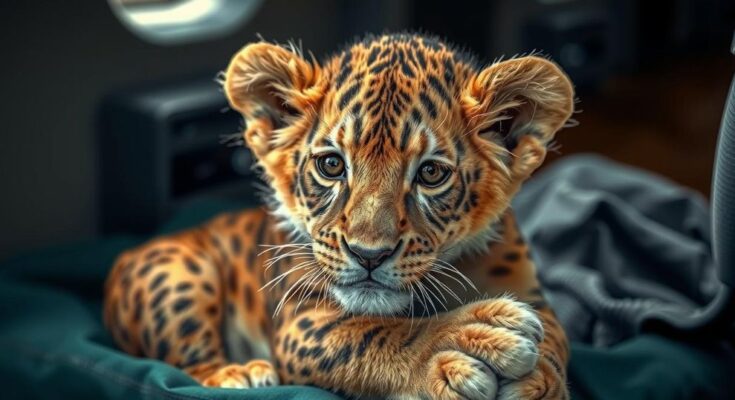A rescue team from Animals Lebanon evacuated a lion cub affected by war in Lebanon, relocating her to a wildlife refuge in South Africa. The initiative showcases the interconnectedness of animal welfare with community support amid ongoing conflict, emphasizing the organization’s role in mitigating suffering for both animals and their human caretakers.
In the early hours of dawn, a team from the Lebanese animal welfare organization, Animals Lebanon, transported a lion cub labeled as “live lion” onto a yacht in Beirut’s Dbayeh district. The cub was rescued from an exploitative social media environment where she was utilized as a prop in TikTok videos. With the ongoing conflict in Lebanon, the organization faced logistical challenges in relocating the cub, named Sara, to a sanctuary in South Africa, making the laborious trip via Cyprus, Dubai, and finally to Cape Town. Once at the Drakenstein Lion Park in South Africa, Sara joined her new companions. This rescue marks the fifth lion Animals Lebanon has saved since the onset of significant conflict in the region which began escalating with the assassination of Hezbollah leader Hassan Nasrallah in September. Since its inception in 2008, Animals Lebanon has successfully rescued and relocated a total of 25 big cats from Lebanon to various wildlife sanctuaries worldwide. In light of the conflict, Animals Lebanon has adjusted its operations. Initially capable of airlifting animals, they faced limitations as the only remaining airline, Middle East Airlines, ceased transporting animals. This prompted cofounder Jason Meier to turn to alternative solutions. Critically aware of the dire human circumstances surrounding the war, he emphasizes the interconnectedness of animal rescue with community support, noting, “This is the expertise we have, and while we are helping animals, we are directly helping people.” Sara had been housed temporarily in the spare bedroom of Meier and his Lebanese wife, who co-founded the organization with him. Their headquarters in Beirut houses numerous pets left behind by displaced owners seeking refuge from continued airstrikes. Meier mentioned receiving requests for assistance over a thousand times, underscoring the vitally compassionate role they play amidst widespread suffering. The organization removed the four-month-old cub from a social media influencer who had ignored her needs, as she bore physical scars and ringworm from her previous living conditions. It is illegal to keep lions and tigers as pets in Lebanon, yet such ownership has become a phenomenon among affluent individuals. Unfortunately, the country lacks adequate veterinary care and facilities, leading to poor living conditions for captive animals. Meier stated, “You don’t really have the veterinary expertise in this country.” In addition to Sara, Animals Lebanon facilitates the rescue of other animals, including baboons and various big cats from zoos that fail to meet their basic needs. As the organization navigates the complexities of animal care amidst war, both Meier and his team exhibit unwavering dedication to their mission. Shaarawi, one of the caretakers, shared an emotional moment as the yacht departed, reflecting on the challenges of caring for a wild animal in a war zone, stating, “It was challenging. I thought, ‘God forbid, there’s a bombing — how would I run away with a lion?’ But she was the reason I woke up every morning.”,
The situation in Lebanon has deteriorated since fighting broke out between Hezbollah and Israeli forces, leading to a humanitarian crisis with millions displaced and countless animals left in dire conditions. Amidst the chaos, Animals Lebanon operates to rescue and relocate animals caught up in this conflict, demonstrating a critical intersection between animal welfare and human crises in war-afflicted regions. The organization’s focus encompasses rescuing not only abused wildlife but also pets whose owners are unable to care for them due to the upheaval caused by continued airstrikes and violence. Their ongoing efforts highlight the broader issues of illegal animal trade and inadequate care facilities in Lebanon.
The rescue of the lion cub Sara from a life of exploitation serves as a poignant reminder of the bond between human welfare and animal rights, particularly in conflict zones. Through their dedicated efforts, Animals Lebanon not only provides sanctuary to displaced animals but also reinforces the importance of compassionate outreach amidst adversity. Their work exemplifies the potential for positive impact in the face of brutality and instability, demonstrating how addressing animal welfare can, indeed, assist human communities in distress.
Original Source: www.wxxinews.org




